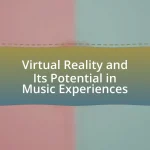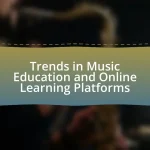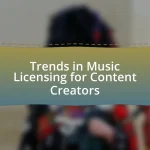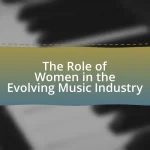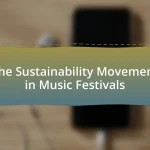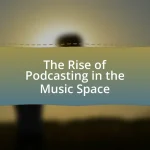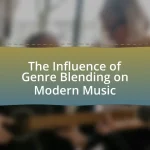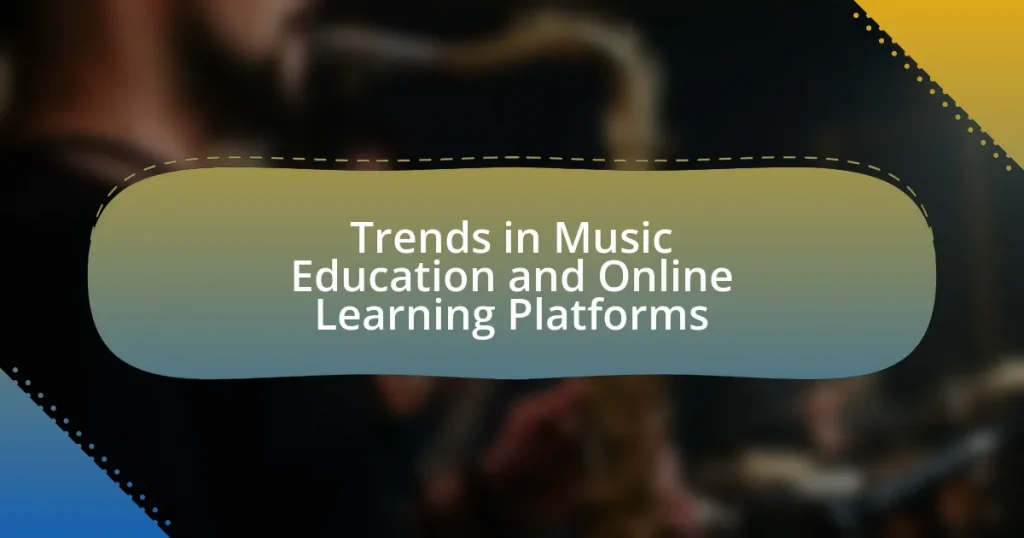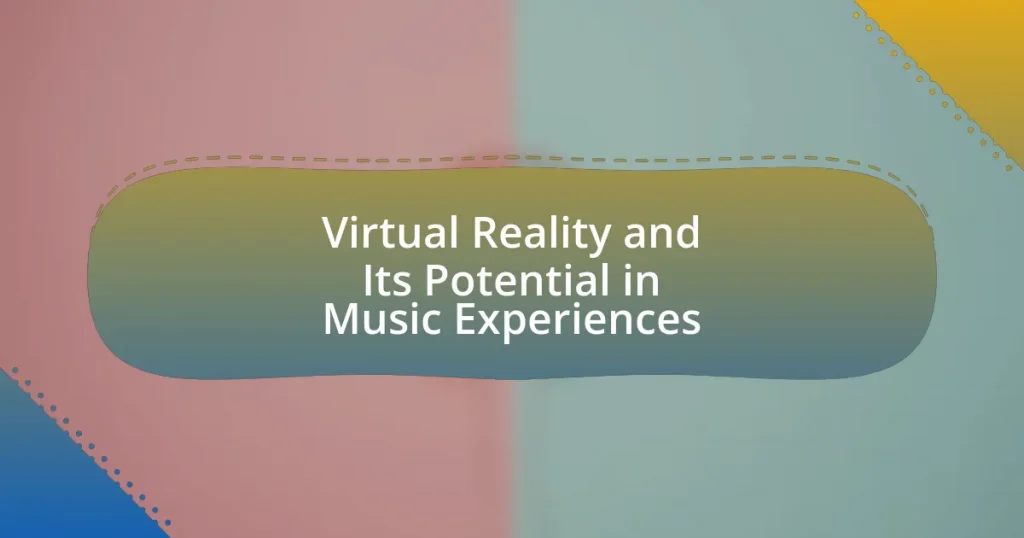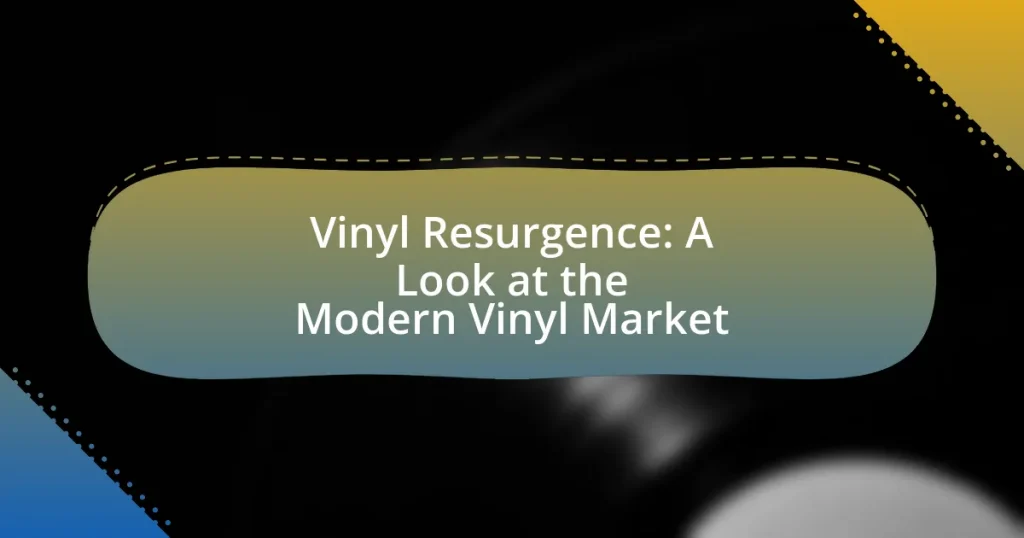The article examines current trends in music education and the impact of online learning platforms. It highlights the integration of technology, personalized learning, and diverse musical genres as key developments in the field. The use of online platforms, such as YouTube and music education apps, has increased accessibility and engagement, allowing students to learn at their own pace. Additionally, the article discusses the role of artificial intelligence and interactive tools in enhancing learning experiences, while also addressing challenges such as student engagement and technology access. Overall, it provides insights into the evolving landscape of music education and the implications for educators and students.
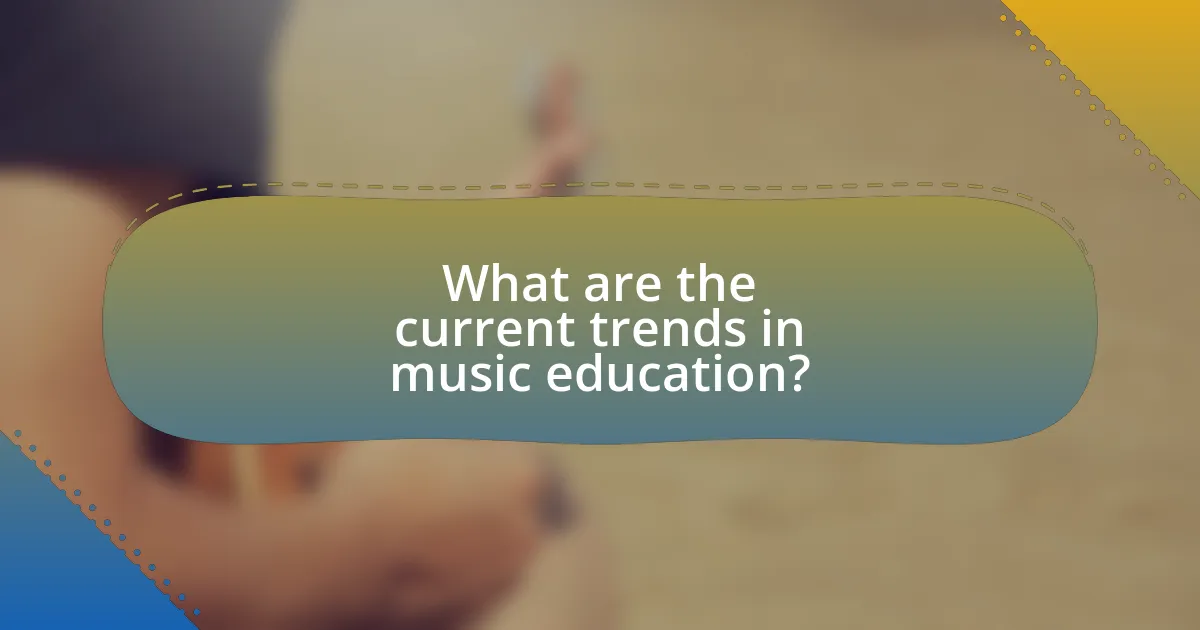
What are the current trends in music education?
Current trends in music education include the integration of technology, personalized learning, and a focus on diverse musical genres. The use of online learning platforms has surged, allowing students to access a wide range of resources and instruction from anywhere. For instance, platforms like YouTube and dedicated music education sites provide tutorials and lessons that cater to various skill levels and musical styles. Additionally, there is an increasing emphasis on social-emotional learning within music education, recognizing the role of music in fostering creativity and collaboration among students. Research indicates that these trends enhance engagement and improve learning outcomes, as evidenced by studies showing that technology integration can lead to higher student motivation and achievement in music programs.
How has technology influenced music education?
Technology has significantly influenced music education by enhancing accessibility, engagement, and instructional methods. Online learning platforms, such as YouTube and various music education apps, allow students to access a vast array of resources and tutorials, enabling self-paced learning. According to a study by the National Association for Music Education, 70% of music educators reported using technology to facilitate lessons, demonstrating its integration into curricula. Additionally, software like notation programs and digital audio workstations has transformed composition and arrangement practices, allowing students to create and share music more easily. This shift towards technology-driven education has made music learning more interactive and personalized, catering to diverse learning styles and preferences.
What specific technologies are being integrated into music education?
Specific technologies being integrated into music education include digital audio workstations (DAWs), online learning platforms, mobile applications, and virtual reality (VR) tools. Digital audio workstations, such as Ableton Live and GarageBand, allow students to compose, edit, and produce music digitally, enhancing their technical skills. Online learning platforms like Coursera and YouTube provide access to a wide range of music courses and tutorials, facilitating self-paced learning. Mobile applications, such as Yousician and SmartMusic, offer interactive practice tools and feedback, making learning more engaging. Virtual reality tools create immersive environments for music performance and collaboration, allowing students to experience music in innovative ways. These technologies collectively enhance the accessibility, engagement, and effectiveness of music education.
How do these technologies enhance learning experiences?
Technologies enhance learning experiences in music education by providing interactive and personalized learning environments. Online platforms enable students to access a wide range of resources, including video tutorials, sheet music, and virtual instruments, which cater to diverse learning styles. For instance, a study by the International Society for Technology in Education found that 85% of educators reported improved student engagement when using digital tools in their teaching. Additionally, technologies facilitate real-time feedback through applications that analyze performance, allowing learners to track their progress and make adjustments accordingly. This immediate feedback loop is crucial for skill development in music, as it helps students refine their techniques and understand complex concepts more effectively.
What role do online learning platforms play in music education?
Online learning platforms play a crucial role in music education by providing accessible and flexible learning opportunities for students worldwide. These platforms enable learners to access a wide range of resources, including video tutorials, sheet music, and interactive lessons, which cater to various skill levels and musical genres. For instance, platforms like Coursera and Udemy offer courses taught by experienced musicians and educators, allowing students to learn at their own pace. Additionally, research indicates that online music education can enhance engagement and retention, as students can revisit materials and practice on their own schedule. This accessibility democratizes music education, making it available to individuals who may not have access to traditional music schools or instructors.
How do online platforms compare to traditional music education methods?
Online platforms offer greater accessibility and flexibility compared to traditional music education methods. While traditional methods often require physical attendance and fixed schedules, online platforms allow students to learn at their own pace and access a wide range of resources from anywhere. For instance, a study by the National Endowment for the Arts in 2020 found that online music education can reach a broader audience, with 70% of participants reporting increased engagement due to the convenience of online learning. Additionally, online platforms often provide diverse instructional styles and materials, catering to various learning preferences, which can enhance the educational experience compared to the more uniform approach of traditional classrooms.
What are the advantages of using online learning platforms for music education?
Online learning platforms for music education offer flexibility, accessibility, and a wide range of resources. These platforms allow students to learn at their own pace, accommodating various schedules and learning styles. Research indicates that 70% of students prefer online learning due to its convenience and the ability to access materials anytime, anywhere. Additionally, online platforms often provide diverse instructional methods, including video tutorials, interactive exercises, and community forums, enhancing the learning experience. This variety caters to different musical interests and skill levels, making music education more inclusive and personalized.
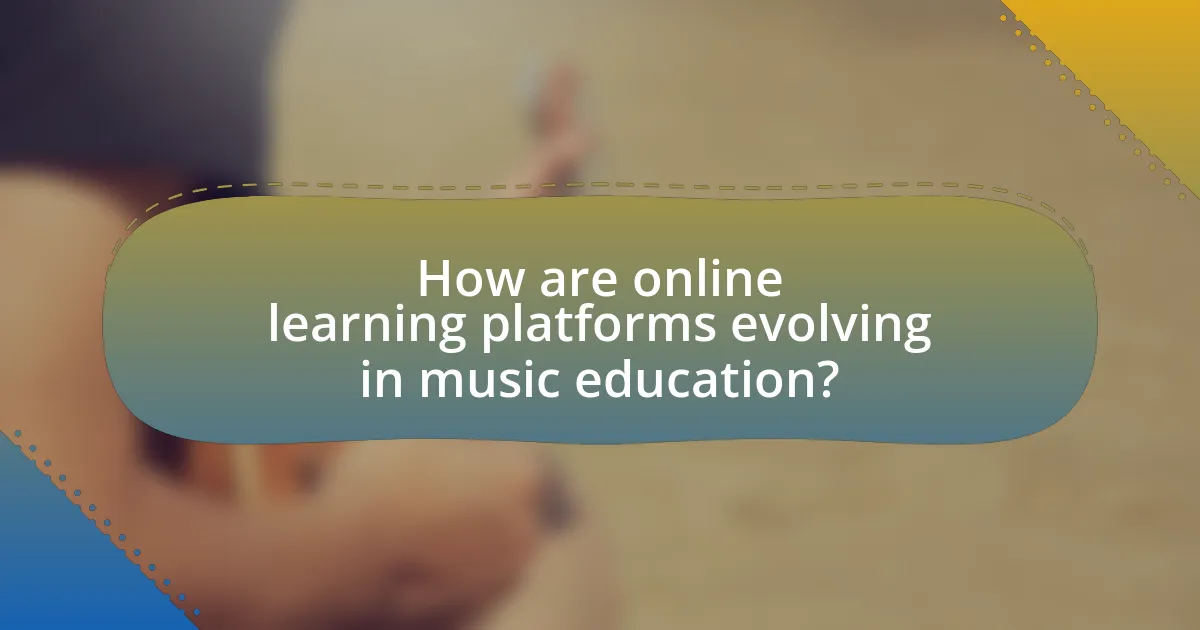
How are online learning platforms evolving in music education?
Online learning platforms are evolving in music education by integrating advanced technologies such as artificial intelligence, interactive tools, and personalized learning experiences. These platforms now offer features like real-time feedback on performance, adaptive learning paths tailored to individual skill levels, and access to a wide range of resources including video tutorials and virtual masterclasses. For instance, platforms like Yousician and SmartMusic utilize AI to analyze users’ playing and provide instant feedback, enhancing the learning process. Additionally, the rise of community-driven platforms allows for peer collaboration and networking, further enriching the educational experience. This evolution reflects a shift towards more engaging, flexible, and accessible music education, catering to diverse learning styles and preferences.
What features are essential for effective online music education platforms?
Effective online music education platforms must include interactive learning tools, personalized feedback mechanisms, and a diverse range of instructional content. Interactive learning tools, such as virtual instruments and real-time collaboration features, enhance student engagement and facilitate practical application of skills. Personalized feedback mechanisms, including video assessments and tailored lesson plans, ensure that learners receive guidance suited to their individual progress and needs. A diverse range of instructional content, encompassing various genres and skill levels, caters to a broader audience and supports comprehensive music education. These features collectively contribute to a more effective and engaging online learning experience in music education.
How do interactive tools improve student engagement in online music learning?
Interactive tools enhance student engagement in online music learning by providing immersive and participatory experiences that foster active involvement. These tools, such as virtual instruments, gamified learning platforms, and collaborative software, allow students to practice, create, and share music in real-time, which increases motivation and retention. Research indicates that students using interactive tools demonstrate higher levels of engagement and achievement compared to traditional methods; for instance, a study published in the Journal of Music Education Research found that 85% of students reported increased interest in music lessons when using interactive applications. This evidence supports the effectiveness of interactive tools in making online music learning more engaging and effective.
What role does community play in online music education platforms?
Community plays a crucial role in online music education platforms by fostering collaboration, motivation, and support among learners. This communal environment enhances the learning experience, as students can share resources, exchange feedback, and participate in group activities, which are essential for skill development. Research indicates that social interaction in educational settings significantly improves retention rates and engagement levels, with studies showing that learners in community-oriented platforms report higher satisfaction and achievement. For instance, a study published in the Journal of Music Education Research highlights that peer interactions lead to increased practice frequency and improved performance outcomes. Thus, the presence of a community in online music education platforms is vital for creating a supportive and effective learning atmosphere.
What challenges do online music education platforms face?
Online music education platforms face several challenges, including student engagement, technology access, and instructor quality. Student engagement is often hindered by the lack of personal interaction, which can lead to decreased motivation and retention rates. According to a study by the Online Learning Consortium, online courses have a 10-20% lower retention rate compared to traditional classrooms. Technology access is another significant barrier, as not all students have reliable internet or devices, limiting their ability to participate fully. Furthermore, the quality of instruction can vary widely, as many platforms struggle to recruit and retain qualified music educators, impacting the overall learning experience. These challenges collectively affect the effectiveness and reach of online music education platforms.
How can these challenges be addressed to improve online music education?
To address challenges in online music education, institutions should enhance engagement through interactive platforms and personalized learning experiences. Implementing real-time feedback mechanisms, such as video conferencing for live lessons, can foster a more interactive environment. Research indicates that students who receive immediate feedback are 20% more likely to improve their skills compared to those who do not. Additionally, integrating gamification elements can motivate learners, as studies show that gamified learning increases student retention rates by up to 30%. Providing access to high-quality resources, such as instructional videos and practice tools, further supports diverse learning styles and improves overall educational outcomes.
What are the implications of these challenges for educators and students?
The implications of challenges in music education and online learning platforms for educators and students include increased difficulty in engagement and retention of students, as well as the need for educators to adapt their teaching methods. Educators face the challenge of effectively utilizing technology to create interactive and engaging lessons, which is essential for maintaining student interest in music education. For instance, studies show that students often struggle with self-motivation in online environments, leading to lower completion rates of music courses. Additionally, the lack of face-to-face interaction can hinder the development of essential collaborative skills among students. Therefore, both educators and students must navigate these challenges to enhance the learning experience and outcomes in music education.
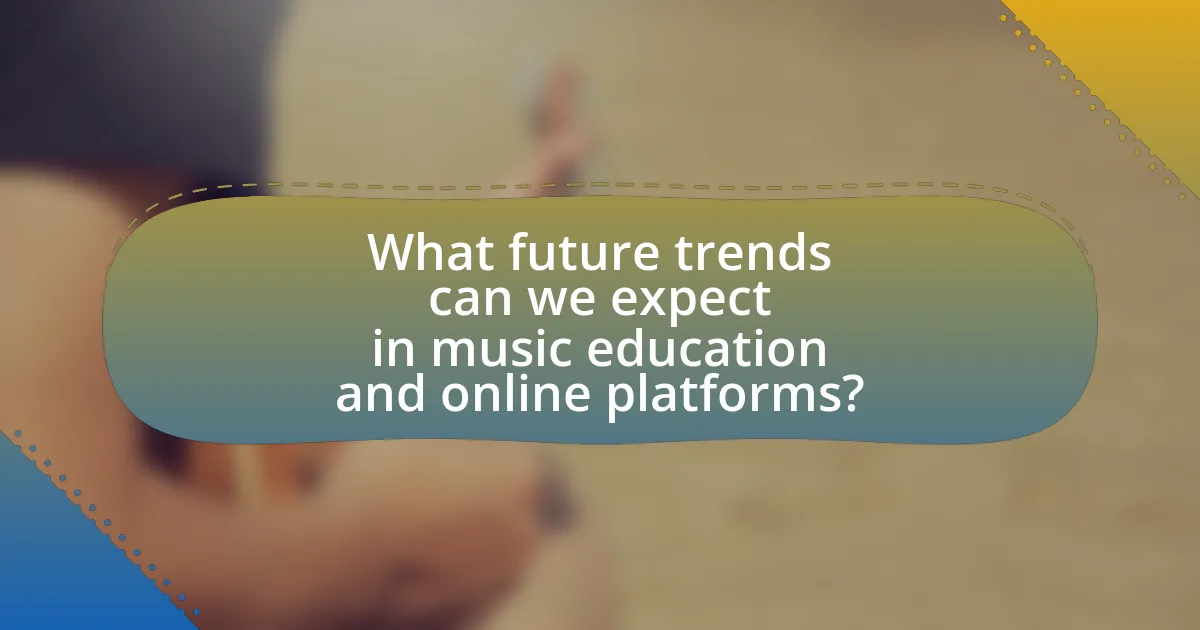
What future trends can we expect in music education and online platforms?
Future trends in music education and online platforms include increased integration of artificial intelligence and personalized learning experiences. AI technologies are being developed to analyze student performance and provide tailored feedback, enhancing the learning process. Additionally, platforms are likely to incorporate virtual reality and augmented reality to create immersive learning environments, allowing students to engage with music in innovative ways. According to a report by the International Society for Technology in Education, 70% of educators believe that technology will significantly change how music is taught in the next decade, indicating a strong shift towards digital and interactive methods in music education.
How might artificial intelligence impact music education?
Artificial intelligence may significantly enhance music education by providing personalized learning experiences and adaptive feedback. AI-driven platforms can analyze a student’s performance in real-time, offering tailored exercises that target specific weaknesses, thereby improving skill acquisition. For instance, applications like SmartMusic utilize AI to assess student playing and provide instant feedback, which has been shown to increase practice efficiency and engagement. Furthermore, AI can facilitate access to high-quality instructional materials and virtual instructors, making music education more accessible to diverse learners. Studies indicate that such technologies can lead to improved learning outcomes, as they cater to individual learning paces and styles.
What are the potential benefits of AI in personalized music learning?
AI in personalized music learning offers tailored instruction that adapts to individual student needs, enhancing engagement and effectiveness. By analyzing a learner’s progress and preferences, AI can provide customized feedback and practice recommendations, which has been shown to improve skill acquisition. For instance, a study by the University of Southern California found that students using AI-driven platforms demonstrated a 30% increase in practice efficiency compared to traditional methods. Additionally, AI can facilitate access to diverse learning resources and styles, accommodating various learning paces and preferences, thus promoting a more inclusive educational environment.
What ethical considerations arise with the use of AI in music education?
The ethical considerations that arise with the use of AI in music education include issues of data privacy, bias in algorithmic decision-making, and the potential for devaluation of human creativity. Data privacy concerns stem from the collection and use of personal information from students, which can lead to unauthorized access or misuse. Bias in AI algorithms can result in unequal learning opportunities, as these systems may favor certain musical styles or demographics over others, thereby perpetuating existing inequalities. Additionally, reliance on AI tools may undermine the value of human creativity and the unique contributions of educators, as students might prioritize AI-generated content over traditional learning methods. These considerations highlight the need for careful implementation and oversight of AI technologies in music education to ensure equitable and ethical practices.
What best practices should educators follow when using online platforms for music education?
Educators should prioritize interactive engagement and personalized learning when using online platforms for music education. Interactive engagement can be achieved through live sessions, discussions, and collaborative projects, which enhance student participation and motivation. Personalized learning involves tailoring lessons to meet individual student needs, allowing for varied paces and styles of learning. Research indicates that personalized approaches can improve student outcomes, as seen in a study by the Bill & Melinda Gates Foundation, which found that adaptive learning technologies significantly boost student performance in online environments. Additionally, educators should utilize high-quality resources and tools, such as digital sheet music and music production software, to enrich the learning experience. Regular feedback and assessment are also crucial, as they help track progress and adjust teaching strategies effectively.
How can educators effectively integrate online tools into their teaching methods?
Educators can effectively integrate online tools into their teaching methods by utilizing platforms that enhance engagement and facilitate collaboration. For instance, tools like Google Classroom and Zoom allow for real-time interaction and resource sharing, which can significantly improve student participation and understanding. Research indicates that 70% of educators who use online tools report increased student engagement, as these platforms provide diverse learning modalities that cater to different learning styles. Additionally, incorporating multimedia resources such as videos and interactive quizzes can further enrich the learning experience, making complex concepts more accessible.
What strategies can enhance student motivation and success in online music education?
To enhance student motivation and success in online music education, implementing interactive and personalized learning experiences is essential. Research indicates that students are more engaged when they participate in activities that allow for creativity and self-expression, such as collaborative projects and virtual performances. Additionally, providing regular feedback and setting clear, achievable goals can significantly boost motivation, as students feel a sense of progress and accomplishment. A study published in the Journal of Music Education Research found that students who received consistent feedback and had access to tailored resources showed a 30% increase in engagement levels compared to those who did not. Therefore, utilizing interactive tools, fostering collaboration, and ensuring personalized feedback are effective strategies for enhancing motivation and success in online music education.
